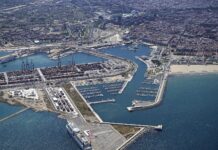
The Port of Rotterdam has handled 10.2 million TEUs in the first nine months of 2023, translating to a 7.2% decline compared with the same period last year.
Additionally, the Dutch port has moved 329.9 million tonnes, compared to 351 million tonnes in the same months in 2022.
“Global demand for freight is still lower than in 2022 as a result of inflation, limited economic growth, geopolitical tensions and higher spending on services rather than products,” said the major European port pointing out that “this has a knock-on effect on the throughput of containers in Rotterdam.”
Moreover, roll-on/roll-off traffic (-3.8%) and other general cargo (-13.7%) fell as a result of reduced consumer spending, large stocks and lower investments. The total throughput in the breakbulk segment decreased by 6%.
Furthermore, the dry bulk segment declined by a total of 11.9% in the first nine months of the year, while coal throughput fell significantly (-16.8%), mainly because less coal was fired in power plants.
The liquid bulk segment also experienced a drop of 2.4%, while the throughput of LNG rose slightly by 0.4%, as more LNG was imported to replace Russian pipeline gas. The throughput of crude oil fell by 1.9% as a result of increased maintenance work to the refineries, which reduced the supply of crude oil. Mineral oil products dropped by 3.1%.
“The decline was mainly related to the throughput of containers and coal. Throughput of iron ore and scrap, agricultural bulk and LNG increased,” noted the port in a statement.
Boudewijn Siemons, interim CEO and COO of Port of Rotterdam Authority, commented, “The economy has not yet recovered and this continues to impact throughput figures. In spite of less throughput, we are committed to investing in a vital and climate-neutral port. In the third quarter, we reached an important milestone in the CO2 transport and storage project, Porthos.”








